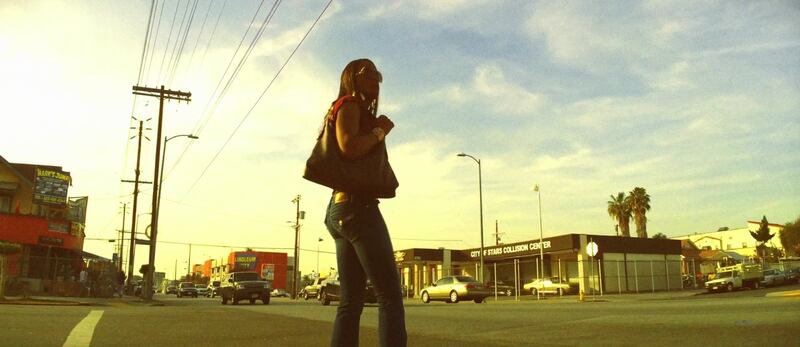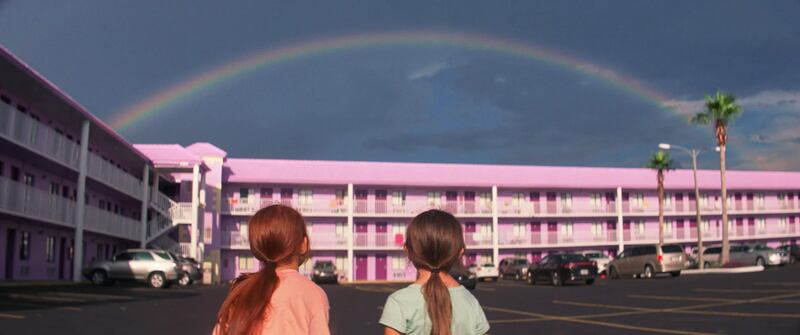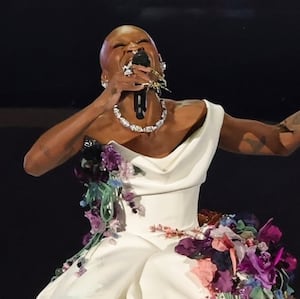Sean Baker made Oscars history by becoming the only person ever to win four Academy Awards in a single night for his film Anora.
It’s a feat that not even the likes of Steven Spielberg or Martin Scorsese have achieved, and Baker has been an indie darling for years—and, certainly this season, an awards favorite. But it’s likely the majority of people watching, at least by the third or fourth time he went up on the Oscar stage, wondered, “Who is this guy?”
After all, Anora, for all the accolades it has received, is not a movie that a large swath of the Academy Awards audience has seen.
On Sunday night, Anora, a film about a young sex worker from Brooklyn who gets her chance at a Cinderella ending when she meets and marries the son of a Russian Oligarch, raked in five Academy Awards in total. One award went to the film’s star, Mikey Madison, who won Best Actress, while the other four went to Baker, who won Best Director, Best Original Screenplay, Best Editing, and Best Picture.

Mikey Madison as Ani in Anora.
NEONWith this historical sweep, Baker ties with mega-giant filmmaker Walt Disney as the most decorated Oscar-winner in a single night. But Walt Disney won his for four different films in 1953; Baker pulled in all four of his awards for a single movie. And he did it with a film that focuses on a group of people that are historically ignored and looked down upon in Hollywood—sex workers.
During his speech for Best Original Screenplay, Baker made it a point to thank the numerous sex workers who contributed and consulted on Anora, without whom he claims the movie would not be possible.
“They have shared their stories; they have shared their life experience with me over the years. My deepest respect. Thank you. I share this [award] with you,” Baker said.
For those unfamiliar with Baker and his work—and especially those who have not seen Anora—thanking sex workers in his speech certainly raised eyebrows. But it’s a subject matter he’s passionate about.
As his wife and producing partner, Samantha Quan, told the Associated Press, a throughline of Baker’s films is that he’s interested in “people and situations that are always there but people choose not to see them.”
Baker’s path to Oscar glory wasn’t a typical one. He attended New York University’s film studies program, before dropping out in 1992 to gain industry experience. (He’d eventually return to get his degree in 1998.)
After his first feature film, 2000’s Four Words, he developed a drug addiction that he’d later say was formative.
“That really gave me a chance to restart myself because I was down and out,” Baker told the AP. “I lost all my friends. I lost everything. I had no more contacts. Everybody who I went to school with had been in Hollywood working. Todd Phillips, I went to school with. He was already making his first film, and I was getting off of heroin.”
He was living above a Chinese restaurant at the time, and would spend time speaking with the delivery workers, a majority of whom were undocumented immigrants. It would inspire his next feature, 2004’s Take Out, as well as his signature filmmaking style of immersing himself in a community on the outskirts of society’s spotlight for research and, often, casting non-actors from those worlds in his films.
After last night, Anora will likely become one of Baker’s most widely recognized and decorated films. However, Anora is by no means the first time Baker saw success with a film focused on people living on the margins of society. In fact, one could even say that it’s his bread and butter.
Tangerine

After Take Out, Baker made two films, 2008’s Prince of Broadway and 2012’s Starlet. But in 2015, Baker broke onto the indie film scene in a major way with Tangerine, a comedy-drama about Sin-Dee Rella, a transgender sex worker, who upon discovering that her pimp-boyfriend was unfaithful to her during her stint in jail, embarks on an odyssey that takes throughout the seedy underbelly of Los Angelos in the hopes of confronting her boyfriend.
After the film’s release, Baker immediately became a critically acclaimed indie filmmaker, with many in the industry praising the subject matter of his script and his use of iPhone 5S' to shoot the film.
The Florida Project

Following the success of Tangerine, Baker defied industry expectations of moving to bigger projects by sticking to his indie roots with the release of The Florida Project, a drama based in Greater Orlando about a six-year-old girl living in a motel in the shadow of Disney World with her troubled mother, following the pair as they try to make ends meet.
Like Tangerine, The Florida Project was an instant hit after it emerged on the film festival circuit, solidifying Baker as an auteur to watch and scoring star Willem Dafoe an Oscar nomination.
Red Rocket

In 2021, Baker returned to a familiar subject matter with Red Rocket, a black comedy about Mikey, a con man and washed-up porn star, who is plotting his return to the “big leagues” from the confines of his small hometown in Texas.
It starred former heartthrob and MTV star Simon Rex, in a career-renaissance role.
Once again, Baker saw critical success with Red Rocket, which received a standing ovation from audiences at the 2021 Cannes Film Festival.
Anora and the Oscars

Mark Eydelshteyn and Mikey Madison.
NEONIn 2025, Baker reached new heights of success with Anora. But despite many years of critical acclaim, what makes Baker perhaps such a notable and intriguing filmmaker is his refusal to sell out. With his reputation in Hollywood, Baker could have moved on to bigger and splasher blockbuster projects. Instead, he has remained almost singlehandedly focused on telling the stories about people society actively ignores and overlooks.
“It’s not about opening doors,” he said of Anora’s rave reception after its Cannes Film Festival premiere. “It’s certainly not about trying to get into the studio. To tell you the truth, it does the exact opposite. It says: OK, good. Now we can continue to do this.”
After Anora came out, many people termed it as the 21st-century answer to the Cinderella fairy tale, only this time with a more realistic ending.
It’s a reasonable assessment, but one could argue that Baker’s films have always been about achieving the coveted happily-ever-after, the kind typically only found within the pages of our storybooks. At the heart of his filmography are people who, regardless of their class, race, or gender identity, are fighting for their happy endings—if only our society would let them have it.









